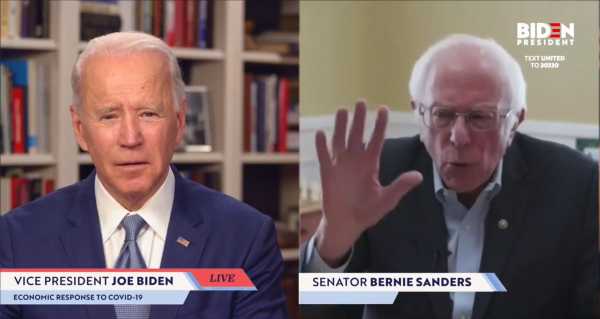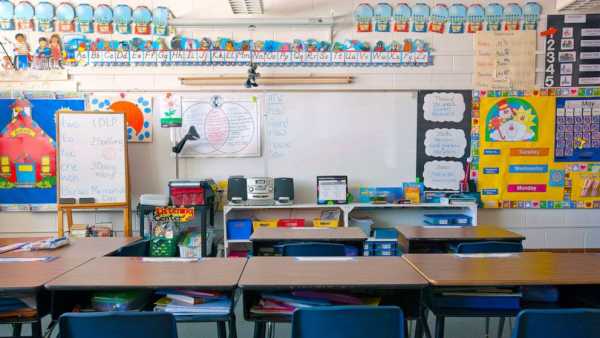
The New York state presidential primary is back on for late June. (For now.)
Though the state was always going to hold state and local primaries on June 23, the New York State Board of Elections had removed the presidential race from the ballot — infuriating progressives who hoped to win delegates to the national convention and prompting a legal challenge. Federal district court Judge Analisa Torres ruled Tuesday that the cancellation violated the First and 14th Amendment rights for New York business leader Andrew Yang, who initially filed the suit in New York’s Southern District, as well as those of Bernie Sanders and eight other former candidates.
“The Court concludes that Plaintiffs and Plaintiff-Intervenors have shown a clear and substantial likelihood of success on the merits of their claim that the Democratic Commissioners’ April 27 Resolution removing Yang, Sanders, and eight other Democratic presidential candidates from the ballot deprived them of associational rights under the First and Fourteenth Amendments to the Constitution,” Torres ruled.
Yang praised the judge’s decision on Twitter Tuesday, as did the Sanders campaign.
“We’re glad Judge Torres has restored basic democracy in New York,” Sanders campaign manager Faiz Shakir said in a statement. “People in every state should have the right to express their preference in the 2020 Democratic primary. We have confidence that New York can hold elections in June in a safe manner that preserves New Yorkers’ right to vote.”
In early April, New York Gov. Andrew Cuomo signed an appropriations bill that gave the state Board of Elections the power to remove candidates who had previously dropped out from the primary ballot. Shortly after, the board did just that, canceling the state’s presidential primary under the premise that former Vice President Joe Biden was the only candidate left in the race and that holding an election would risk furthering the spread of the coronavirus.
In some precincts in the state, the presidential primary was the only race on the ballot, meaning that canceling the race would spare many poll workers from risking infection to facilitate voting. New York Democratic Party Chair Jay Jacobs said in mid-April that the cancellation of the state’s presidential primary would mean a lower expected turnout and a reduced need for polling places.
“It just makes so much sense given the extraordinary nature of the challenge,” Jacobs said. “We shouldn’t have nonessential primaries. There is only one candidate who is running.”
The move outraged progressives, many of whom pointed out that even with candidates out of the race, Sanders and others could still win convention delegates. Those delegates would have a say over non-candidate convention matters, like the party’s official policy platform.
“Today’s decision by the State of New York Board of Elections is an outrage, a blow to American democracy, and must be overturned by the DNC,” Sanders’s campaign senior adviser Jeff Weaver told Vox at the time. “Given that the primary is months away, the proper response must be to make the election safe — such as going to all vote by mail — rather than eliminating people’s right to vote completely.”
It appears the state will facilitate voting-by-mail for hundreds of down-ballot primary races, despite canceling the election at the top of the ticket on June 23. Cuomo ordered on April 24 that all registered voters be sent an application for a mail-in ballot for the primary.
Douglas A. Kellner, a co-chair of the New York Board of Elections, told the New York Times the board was “reviewing the decision and preparing an appeal.” Cuomo told CNN Tuesday that the primary would go forward as ordered by the court, but the state may pursue an appeal.
So for now, the New York presidential primary is back on, but still up in the air pending any appeals.
State election officials struggle to balance safety and ballot accessibility in the pandemic
Election safety has taken center stage in the 2020 election cycle as the novel coronavirus pandemic has worn on, with states each taking different approaches.
While at least 15 states thus far have postponed their primaries, New York had been the first to outright cancel its Democratic presidential primary. Five states canceled their Republican primaries before the pandemic, citing President Donald Trump as the party’s obvious incumbent candidate.
Controversially, Wisconsin went ahead with its primary on April 7, despite being under a shelter-at-home order from Democratic Gov. Tony Evers. The governor initially resisted trying to delay the election before undertaking a last-minute effort to postpone it. When a judge dismissed the delay, Evers then attempted to make it easier for its residents to vote by mail.
Democrats in the state were split over whether to delay the primary; Republicans largely opposed it, and a couple of lawsuits were filed. One filed by the Republican National Committee over whether mail-in ballots needed to be postmarked by election day, April 7, versus an April 13 extension ordered by a lower court, ended up at the US Supreme Court.
The Court ended up ruling that mail-in ballots must be postmarked by election day in order to be counted, even though hundreds of thousands of people in the state who requested a mail-in ballot didn’t end up receiving one. This forced Wisconsinites to turn out to vote in person, despite the fact that hundreds of poll workers refused to work on election day, shuttering hundreds of voting locations in the state.
The result was hours-long lines to vote throughout the most populated cities in Wisconsin, bringing on more than 50 new infections in the state.
Congressional Democrats have hoped to see the US avoid Wisconsin’s fate in this fall’s general election; however, repeated attempts to give states funding to conduct vote-by-mail have run into overwhelming Republican opposition to the idea.
Trump claimed, without evidence, that vote-by-mail made it easier to commit fraud, despite having voted by mail himself in New York in the 2018 midterm elections, as well as in Florida in this year’s primary.
In the end, in-person voting this fall could put millions of Americans at risk of catching a potentially deadly virus, just to exercise their right to vote.
Support Vox’s explanatory journalism
Every day at Vox, we aim to answer your most important questions and provide you, and our audience around the world, with information that has the power to save lives. Our mission has never been more vital than it is in this moment: to empower you through understanding. Vox’s work is reaching more people than ever, but our distinctive brand of explanatory journalism takes resources — particularly during a pandemic and an economic downturn. Your financial contribution will not constitute a donation, but it will enable our staff to continue to offer free articles, videos, and podcasts at the quality and volume that this moment requires. Please consider making a contribution to Vox today.
Sourse: vox.com






